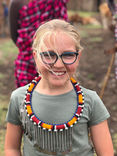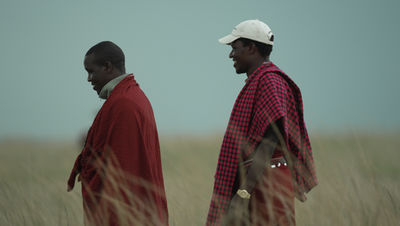

Sustainability at Naibor

The Masai Mara, one of Africa’s most renowned wildlife reserves, offers stunning landscapes, diverse wildlife, and the incredible spectacle of the Great Migration. However, tourism can have significant environmental and social impacts. At Naibor, we are committed to minimising these effects while supporting conservation efforts and empowering local communities.
We focus on three key pillars to ensure our safaris are sustainable:
Environmental Conservation
Low Impact Infrastructure: Naibor has been thoughtfully designed with a minimal footprint to blend seamlessly into the environment. If the camp were ever to be dismantled, there would be no lasting impact on the surrounding nature.
No Generators: Our camp runs entirely on 100% solar power, eliminating the need for noisy generators and significantly reducing our carbon footprint.
Reduce, Reuse, Recycle: We are committed to sustainable practices by employing strict recycling systems to ensure that recyclable materials are properly processed.
-
All water in the rooms is stored in recycled wine bottles.
-
We purchase products in glass containers where possible and repurpose those for storing homemade items like jams, sauces, and granola, eliminating the need for cling film.
-
Reusable metal water bottles are provided to each guest on arrival, which can be refilled at the main mess, helping to reduce plastic waste.
-
Locally Sourced Food: We aim to prepare meals using locally sourced, organic ingredients wherever possible. This supports the local economy and reduces the environmental impact of our food supply.

Community Engagement at Naibor Camp
At Naibor, we believe in making a positive impact on the local Masai communities by fostering employment, cultural exchange, and fair wages.
Local Employment: Approximately 75% of our staff come from the local community, providing a steady income for many families who were traditionally reliant on livestock and agriculture.
Cultural Exchange & Support: We encourage guests to visit local communities and villages to learn about Masai traditions and purchase authentic, locally made products directly from the artisans.
Community Levy: We charge a Community Levy to each guest, ensuring that the benefits of tourism are shared with the surrounding communities. This levy helps Maasai communities receive the support they need to protect wildlife and provides funding for local schools, healthcare, and infrastructure.

Wildlife Protection at Naibor Camp
At Naibor, we are deeply committed to ethical wildlife experiences, wildlife protection, and supporting efforts to prevent poaching and combat wildlife trafficking.
Ethical Game Drive Protocols: Our guides at Naibor adhere to strict ethical game drive protocols and undergo regular training on best practices. We always prioritise the safety and well-being of the animals we encounter.
Our guidelines include:
-
Maintaining a safe distance from animals
-
Turning off the engine at sightings
-
Avoiding off-road driving unless permitted
-
Waiting for other vehicles to leave if there are more than five at a sighting
-
Never blocking an animal’s path or chasing it for a better view
-
Giving extra space to animals that are mating or with young cubs
-
Masai Mara National Reserve Park Fee: Each guest staying at Naibor contributes to the preservation of the Masai Mara through a daily Masai Mara National Reserve Park Fee. This fee helps to support the essential operations of the reserve and ensures the protection of its outstanding biodiversity for future generations.
Your park fee supports:
-
Anti-Poaching & Wildlife Protection: Contributions towards ranger salaries, anti-poaching units, and surveillance efforts to protect wildlife and maintain the health of the ecosystem.
-
Reserve Maintenance & Infrastructure: Funding for roads, bridges, and signage within the reserve, as well as upkeep of ranger posts and staff salaries.
-
Community Development: Part of the fee is allocated to Maasai community projects, including education, healthcare, and water access. It also supports compensation programs for communities affected by human-wildlife conflict.



























